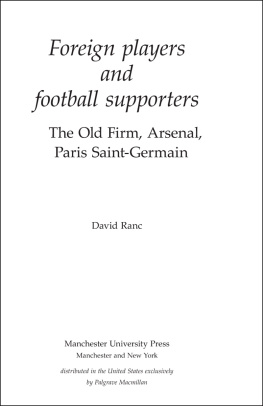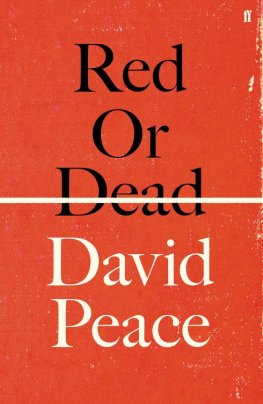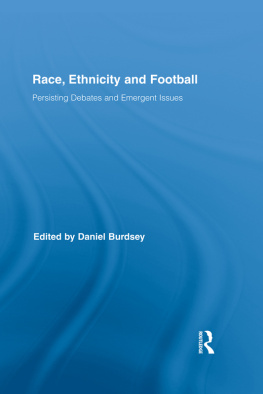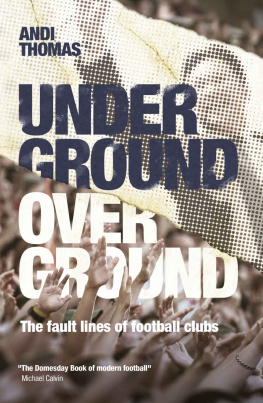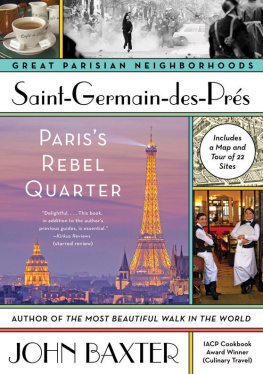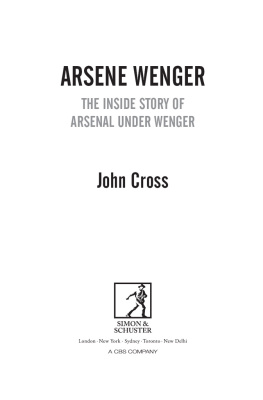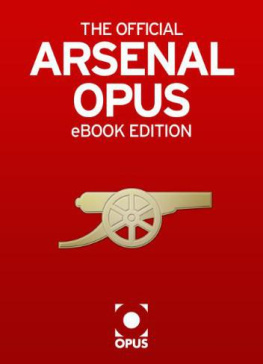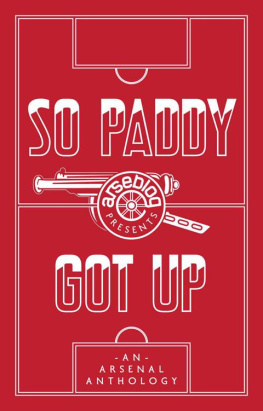FOREIGN PLAYERS AND FOOTBALL SUPPORTERS
Foreign players and football supporters
The Old Firm, Arsenal, Paris Saint-Germain
David Ranc
Copyright David Ranc 2012
The right of David Ranc to be identified as the author of this work has been asserted by
him in accordance with the Copyright, Designs and Patents Act 1988.
Published by Manchester University Press
Oxford Road, Manchester M13 9NR, UK
and Room 400, 175 Fifth Avenue, New York, NY 10010, USA
www.manchesteruniversitypress.co.uk
Distributed in the United States exclusively by
Palgrave Macmillan, 175 Fifth Avenue, New York,
NY 10010, USA
Distributed in Canada exclusively by
UBC Press, University of British Columbia, 2029 West Mall,
Vancouver, BC, Canada V6T 1Z2
British Library Cataloguing-in-Publication Data
A catalogue record for this book is available from the British Library
Library of Congress Cataloging-in-Publication Data applied for
ISBN 978 0 7190 8612 0
First published 2012
The publisher has no responsibility for the persistence or accuracy of URLs for
any external or third-party internet websites referred to in this book, and does not
guarantee that any content on such websites is, or will remain, accurate or appropriate.
Typeset
by Carnegie Book Production, Lancaster
Printed in Great Britain
by CPI Antony Rowe Ltd, Chippenham, Wiltshire
To Trinity Hall, for the continued support I have received from its members. Row Hall!
Football unites all those people who love the game, whether in agreement or disagreement, at the same time as it divides the supporters of the different clubs. The more you know about the game, the deeper the enjoyment; the more passionately you support your club, the deeper your involvement. The amount of intellectual energy generated by football is unimaginably massive; the effect of such passion is to dramatise the lives of people who might otherwise be snared in disadvantage, poverty and disability, with very little to look forward to if not their clubs promotion. This cultural activity receives no support whatever from government because it needs none. (Germaine Greer, The Guardian, 24 March 2008)
Football is an art more central to our culture than anything the Arts Council dare to recognise. (Germaine Greer, The Guardian, 28 May 1996)
Contents
Preface
Having studied (political) history, then political sciences (note the plural) in France, I wanted to research an object which is clearly political but at the level of the people, rather than the level of political or administrative machinery. I was lucky enough to be introduced to the importance of sport in the study of international relations through coursework and research in a seminar led by Dr Paul Dietschy at Sciences Po, in Paris. I realised that sport could provide me with the object I was looking for, in the field that I was and still am most interested in: European studies. I was then fortunate enough to be able to undertake research on this topic in an M.Phil., which later became a Ph.D., at the Centre of International Studies and Trinity Hall, in the University of Cambridge, under the supervision of Dr Geoffrey Edwards. This study is an updated, revised and abridged version of the Ph.D. thesis I submitted in 2007.
Acknowledgements
I would like to thank first and foremost Trinity Hall for funding the years of research needed to write this book, as well as Mr and Mrs Johnson Ng Wai Yee and their children, whose financial assistance was invaluable in the last year of my Ph.D. At Trinity Hall, I am very thankful especially for the help and assistance provided in numerous circumstances by Dr Christopher Padfield, Julie Powley, Dr Nick Bampos, Dr James Montgomery and Dr Nigel Chancellor.
Thanks also to everyone who helped me at the Centre of International Studies. A most conspicuous thank you to my supervisor Dr Geoffrey Edwards who has offered guidance and advice on academic matters, and who convinced me to finish this work: Geoffreys enthusiasm for a dissertation on football, a sport he confesses to know very little about (or in his own words not even like very much), has proved priceless too. I have also learned a lot from the feedback I received on successive drafts of the chapters in the thesis which has given birth to this book.
Thanks also go to the Foundation Wiener-Anspach who allowed me to spend a very interesting year at the Universit Libre de Bruxelles in a research group headed by Professor Jean-Michel De Waele, to whom I also express my warmest thanks.
Thanks also to my family and all the friends (too numerous to mention here), who have supported and helped me. A special thanks to LA to whom I originally planned to dedicate this book.
List of abbreviations
AFP | Agence France Presse |
ASSE | Association Sportive de Saint-tienne |
EC | European Community |
ECJ | European Court of Justice |
EU | European Union |
FC | football club |
FCNA | Football Club de Nantes Atlantique |
FFF | Fdration Franaise de Football |
FIFA | Fdration Internationale de Football Association |
KoB | Kop of Boulogne |
OM | Olympique de Marseille |
PSG | Paris Saint-Germain |
UEFA | Union Europenne de Football Association |
UK | United Kingdom |
US | Union Sportive |
Introduction
On 15 December 1995, the European Court of Justice (ECJ) ruled on the case of the disputed transfer of a Belgian football player, Jean-Marc Bosman, the Court concluded in Bosman that some rules imposed by UEFA were incompatible with the European Community Treaty, more precisely with article 48 on the freedom of movement of workers. The consequences were far reaching. Before Bosman, in many Member States of the European Union (but not, for example, in France or Spain), clubs were allowed to retain a player and demand a transfer fee, even when that players contract was over. After Bosman, this aspect of the transfer system became illegal within the whole of the EU.
The application of UEFAs system of quotas to players hailing from Member States was also declared unlawful. Under UEFAs so-called 3+2 rule (which applied only to European competitions), football clubs had been forbidden to field more than three foreigners, plus two foreigners who had resided and played in an Association for three years or more (assimilated players). In football terms, an Association is broadly synonymous with a country. The main exception is the United Kingdom, which (for historical reasons) is divided between the four Associations of England, Scotland, Wales and Northern Ireland).

